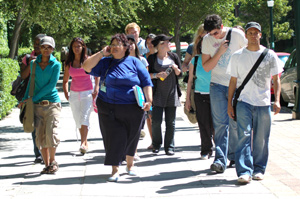Institutional culture bedevilled by fissures, says report
03 March 2008 |
This is one of the findings of the 2007 Institutional Climate Survey, presented at a colloquium led by vice-chancellor and principal, Professor Njabulo S Ndebele, on 22 February. This report is a follow-up to the 2003 Institutional Climate Survey.
In his introduction the vice-chancellor said the survey provided important indicators of additional areas in which the protection of individual rights in the workplace requires attention.
Referring to the end of his second term at the end of June, when Dr Max Price takes the reins, he said: "We have a reflective space in front of us. We need to understand where we've been, where we are and where we might be going."
Other survey findings indicate that a minority - 38% of all staff - believe that the university treats its staff fairly. Forty-four percent of staff feel that workload is unfairly distributed and, asked whether an atmosphere of co-operation exists at UCT, 29% felt that it did while 37% felt that it did not. A majority does not believe that there is mutual respect between PASS staff and academic staff.
The overall indication is that about half of all staff are broadly happy, and the other half are not. Thus 52% agreed that, overall, they are satisfied with their jobs. Forty-seven percent agreed that they experienced a sense of value and respect as UCT employees and 56% felt that the work environment at UCT is welcoming to them as individuals. Forty-four percent agreed that they feel a strong sense of belonging at UCT.
Race and gender continue to dominate in individual experiences of university culture. Some 50% of white males and 52% of white females agreed that they have not been treated differently because of their race and gender. However, all categories of black staff had the inverse response.
Similarly for gender; 43% of all respondents saw discrimination on the basis of gender as a problem, and 29% of all respondents saw sexual harassment as a problem.
One comment read: "I think this survey is merely a public relations exercise aimed at creating the impression that we are transforming, but nothing will be done with the findings of this survey, as was the case with the previous survey. This survey will not tell us anything new."
"The charge that nothing was done to follow up on the 2003 survey can be countered by the Khuluma project, which was developed in response to indications of extensive concerns about racism," said deputy vice-chancellor Professor Martin Hall.
"It is perhaps the largest intervention of its kind at a South African university and has enrolled more than 650 participants to date, with overwhelmingly positive responses. Nevertheless, it is clearly important that there is a directed and focused action plan to take the outcomes of the 2007 survey forward."
The survey indicated that a number of interventions are regarded as successful. For PASS staff, these included the work of transformation committees, employment equity initiatives, and staff development programmes. For academic staff, notable initiatives included the Emerging Researchers Programme.
(Both the 2003 and 2007 reports are available in full on the UCT transformation web page.).
 This work is licensed under a Creative Commons Attribution-NoDerivatives 4.0 International License.
This work is licensed under a Creative Commons Attribution-NoDerivatives 4.0 International License.
Please view the republishing articles page for more information.







